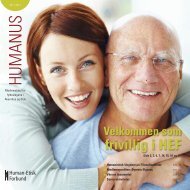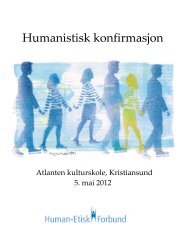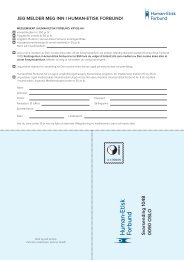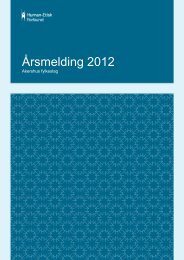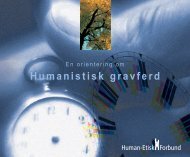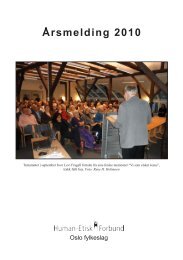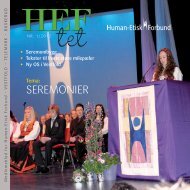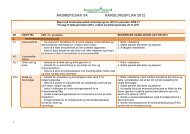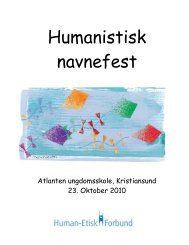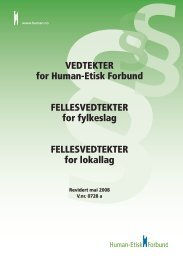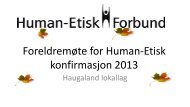Visitation Report 2011 Nigeria Young Humanistas Network - YHN
Visitation Report 2011 Nigeria Young Humanistas Network - YHN
Visitation Report 2011 Nigeria Young Humanistas Network - YHN
Create successful ePaper yourself
Turn your PDF publications into a flip-book with our unique Google optimized e-Paper software.
<strong>YHN</strong> - <strong>Nigeria</strong> <strong>Visitation</strong> <strong>Report</strong> <strong>2011</strong>-09<strong>YHN</strong> takeover of CRARNProgress reportsagreement to members and staff.The tax issue is related to compliance with <strong>Nigeria</strong>n law. <strong>YHN</strong> donot pay income tax.HAMU recommend <strong>YHN</strong> to consider gross salaries when agreeingemployee salaries. This should be considered when compiling the2012 budget.No other major lack of compliance was observed.If CRARN is to be terminated as an organisation Gunnarsuggested that <strong>YHN</strong> should consider taking over the properties ofCRARN (plot and buildings).If CRARN remains a cooperating partner with <strong>YHN</strong> it wasrecommended that <strong>YHN</strong> entered into an agreement with CRARN.The quarterly progress reports received by HAMU have goodactivity description. However, result descriptions were given lessconsideration and should be improved. The received reportscovered activities for the described period only.The reports should be accumulative and structured according toLFA structure (as the application) and promote the Result BasedManagement (RBM) methodology.As an example, a report from Uganda was used to illustrate thecomments from HAMU.More financial information would improve the reports.However, the requirements to the progress reports are stated inour agreement.2.5 Project Meeting at Ibadan – University Conference Centre – Sunday 25.09.<strong>2011</strong>HAMU and <strong>YHN</strong> had a final meeting to summarise the experiences from the visit, includingfeedbacks on both the projects and our schedule of the visit. <strong>YHN</strong> oriented also about plans for2012.During the visit HAMU experienced elements of the advocacy work, information meeting inAkwa-Ibom and listened to the radio jingles. HAMU received copies in English, pidgin Englishand local language.<strong>YHN</strong> reported that a total of 107 cases f prosecution have been reported to the police. 22 caseshave been passed to the courts and 8 are in process.All present from <strong>YHN</strong> answered some questions from HAMU. The summary of the answers:– All agreed with the <strong>YHN</strong> ideology and values; though not all staff was humanists.– All wanted more activity in Akwa Ibom, better service for the street children in Ibadan andcontinue with “Stop bullying” in schools.– Also to be more visible in media and to conduct more public information/promotionmeetings in Akwa Ibom.The answers indicated motivated and collaborated members and staff; ready for 2012.HAMU gave <strong>YHN</strong> a summary of the visit and the experiences; mainly according to paragraphs 5and 6 below.2.6 Financial Review at Ibadan – <strong>YHN</strong> Office – Monday 26.09.<strong>2011</strong>Most <strong>YHN</strong> staff was present during the meeting.The <strong>YHN</strong> financial year is according to the calendar year. They do not depreciate investmentsbut have an equipment register. A petty cash is not used. There are few documented rules andrequirements.The financial situation is reported to the board monthly. The HAMU supported project has adedicated bank account.Page 4 of 12
<strong>YHN</strong> - <strong>Nigeria</strong> <strong>Visitation</strong> <strong>Report</strong> <strong>2011</strong>-09Review of the financial documentation showed that improvements are required; a dedicatedproject ledger as well as receipts should be marked with project name and vouchers should beintroduced for better documentation.Incoming balance of <strong>2011</strong> corresponded with outgoing balance of 2010.<strong>YHN</strong> was recommended to consider using double accounting (credit/debit) starting from 2012and advised to introduce voucher for better documentation.3. <strong>Young</strong> <strong>Humanistas</strong> <strong>Network</strong> – <strong>YHN</strong><strong>YHN</strong> was established in 2005 as an NGO with members aged from 18 to 35. <strong>YHN</strong> is notregistered with the authorities. <strong>YHN</strong> has around 230 members and 50 associate members (nonhumanist).<strong>YHN</strong> has head office in Ibadan and 4 branches in other states. They have a total of13 staff, paid and volunteers. <strong>YHN</strong> started their work in Akwa Ibom in 2008.In addition to activities described in this report <strong>YHN</strong> also promote humanism, rational thinkingand human rights, as well as fighting child labour and giving support to LGBT community (whichthey want to escalate).4. Other Matters4.1 Arrival Meeting <strong>YHN</strong> Staff – Ibadan - Monday 19.09.<strong>2011</strong>The arrival meeting and introduction to get to know each other was at a restaurant/bar.Everybody presented themselves and their role. The restaurant/bar place was regularly used by<strong>YHN</strong>, as it was one of few places that <strong>YHN</strong> members could meet without being charged for thelocation. It was a pleasant meeting with the staff and hot <strong>Nigeria</strong>n food.4.2 Training Workshop in Eket, Akwa-Ibom - Thursday 22.09.<strong>2011</strong>Gunnar conducted a two-hour workshop for <strong>YHN</strong> and CRARN staff on request by <strong>YHN</strong>. Anintroduction to Logical Framework Approach (project design, application and implementation)and importance of reporting project results were covered.The training of 14 persons took place at The CRARN Centre.4.3 Training Workshop in Ibadan - Saturday 24.09.<strong>2011</strong>Gunnar conducted a three-hour workshop for <strong>YHN</strong> staff on request by <strong>YHN</strong>. An introduction toLogical Framework Approach (project design, application and implementation), Result Basedmanagement (RBM), and importance of reporting project results, progress reporting, budgetingwere covered.The training of 7 persons took place at University of Ibadan, Conference Centre.4.4 <strong>YHN</strong> September Discussion Meeting – Ibadan - Monday 19.09.<strong>2011</strong>HAMU attended the <strong>YHN</strong> monthly discussion meeting, which was held at the same place as theintroduction meeting earlier that day. It was announced as an international meeting; with twofrom HAMU, one from Italy and around 25 from <strong>Nigeria</strong> (mainly aged from 19 to 35); animpressing the number of participants. The subject was humanism and experiences. It was agreat discussion and we where impressed by the number participating in the discussion. Not yetused to the dialect it was difficult to understand all due to heavy traffic noise outside.4.5 <strong>YHN</strong> Annual Conference – Ibadan University, Alumni Centre – Friday 23.09.<strong>2011</strong><strong>YHN</strong> conducted a whole day international conference at Ibadan University. Gunnar madegoodwill messages from HAMU. Danladi Dele Agbeyo, a self-declared atheist, presented the leadpaper: Human Rights and Cultural Practices – Witchcraft as a case study.Members of <strong>YHN</strong> presented papers; some examples:– Hawking as a culture and the fate of the <strong>Nigeria</strong>n child by Adebola Ajagunna,– Polygamy, forced marriage and the right of the girl child in <strong>Nigeria</strong> by AyodamolaOwoseye,Page 5 of 12
<strong>YHN</strong> - <strong>Nigeria</strong> <strong>Visitation</strong> <strong>Report</strong> <strong>2011</strong>-09– Championing the causes of street children – a case study of Ibadan by Ayo Ojedokun,– Child preference and the abuse of child rights in <strong>Nigeria</strong> by Tola Layode.The HAMU representatives had expected more students to participate as it was announced atcampus as an open and free conference; though the free lunch was not announced.<strong>YHN</strong> promised to forward soft copies of the papers. They are not yet received.4.6 Departure Dinner with <strong>YHN</strong> Staff – Ibadan – Sunday 25.09.<strong>2011</strong>The parties had the last dinner together at Spice, a restaurant close to the Ibadan UniversityHotel. HAMU thanked for the hospitality of <strong>YHN</strong> and a great time spent tgether.4.7 Presentation and Visit of Street Children Care and Empowerment Project – Monday26.09.<strong>2011</strong>Three represents from <strong>YHN</strong> took Bjørn Torjus to meet the street children, which <strong>YHN</strong> is followingup. We went early in the morning to arrive before they woke up. They lived in a poor area ofIbadan, outside some open spaces they were allowed to stay. They have a leader that chargesthem money to hang around these places. Bjørn Torjus watched around 45 street children inthe age between 12 and 16 years old. The conditions for these street children were tragic asdocumented many times before. They have nobody to take care of them, had no access tohealthcare etc. and even have to earn money. Some of the youngest said they earned as littleas 15 Naira – NOK 0,5 a day.4.8 Visit to School – Tuesday 27.09.<strong>2011</strong>The project director of <strong>YHN</strong> convinced Bjørn Torjus to stay until Tuesday 27.09. to take part in aschool visit. Four representatives from <strong>YHN</strong> had one hour in the morning with the all student atthe secondary school attending. The topic was their project Stop Bullying and they talked aboutthe consequences of bullying. Bjørn Torjus followed up with including this problem into a humanright context. Afterwards there where a session with question from the students with answers;it all worked well. Unfortunately we had too little time to answer all the students that wanted toask in the last session. The children were all well educated, polite and interested.5. Project Observations and Feedbacks5.1 Observations by HAMUThe matters listed below were of minor importance and were not brought up by HAMU. <strong>YHN</strong>should be aware of these matters.– <strong>YHN</strong> provided great service to HAMU representatives during our visit (met at airport,provided transport, booked hotels and local flights, exchange of money, etc.) andaccompanied us at dinners and for drinks. <strong>YHN</strong> was a good host.– In the view of HAMU, <strong>YHN</strong> was too concerned about our safety. However, we appreciatethe concern. As a consequence HAMU had brief periods for preparation and summarisingand did not get an impression of Ibadan as a city.– Future field visits to Akwa-Ibom should be considered to be prior to or after travelling toIbadan to reduce travelling within <strong>Nigeria</strong>.5.2 Comments from HAMUThe matters listed below were brought up by HAMU to <strong>YHN</strong> for the purpose of bettercooperation.– A project visitation should not generate unbudgeted expenses for <strong>YHN</strong>. HAMU shall payexpenses related to their visit and not impose expenses to <strong>YHN</strong>. This visit is believed toimpose minimal expenses to <strong>YHN</strong> by HAMU and is for information only.– HAMU experienced idle periods due to waiting and inadequate planning or communication.However, these were exceptions.– HAMU representatives experienced lack of information of coming events (or skippedevents). This resulted, in a few occasions, in poor preparations by HAMU representatives.Page 6 of 12
<strong>YHN</strong> - <strong>Nigeria</strong> <strong>Visitation</strong> <strong>Report</strong> <strong>2011</strong>-09– HAMU representatives experienced that <strong>YHN</strong> used different names for the project and thatHAMU had accepted changes to the project. In future, both <strong>YHN</strong> and HAMU shouldformalise changes by revising agreement, application or budget.– HAMU representatives should during next visit learn more about advocacy strategy,methods and plans.– HAMU representatives should during next visit families with reunification of rehabilitatedaccused children.5.3 Recommendations to <strong>YHN</strong>The matters listed below were brought up by HAMU to <strong>YHN</strong> for future consideration.– <strong>YHN</strong> should consider recruiting more women for the executive board and for projectimplementation. This will improve gender equality and working environment.– <strong>YHN</strong> should consider revising the board decision to prioritise promotion of projects ratherthan own organisation. HAMU would like to <strong>YHN</strong> to better promote both the project and<strong>YHN</strong> as an organisation to improve on visibility.– <strong>YHN</strong> should consider revising the Project Goal to make it more challenging than “to ensurethat people are aware …”5.4 Promises made<strong>YHN</strong> made the following promises to HAMU during the visitation.– <strong>YHN</strong> will provide more comprehensive result description in future quarterly reports.HAMU did not make any promises to <strong>YHN</strong>.6. Conclusion<strong>YHN</strong> is doing good project implementation work. No area of immediate improvement wasidentified. It was apparent that to secure continuation of services provided by CRARN to theaccused children <strong>YHN</strong> has to take action.<strong>YHN</strong> displayed good collaboration internally and has a well-functioning project group.<strong>YHN</strong> appeared to be a learning organisation. They requested HAMU to continue training to make<strong>YHN</strong> improve.Few areas of improvement were noticed by HAMU.<strong>YHN</strong> is also doing good organisational work through monthly discussion meetings and annualseminars.<strong>YHN</strong> and HAMU cooperated well during the visitation.Page 7 of 12
<strong>YHN</strong> - <strong>Nigeria</strong> <strong>Visitation</strong> <strong>Report</strong> <strong>2011</strong>-097. Appendix A - Project Meeting – 20.09.<strong>2011</strong>THE MINUTE OF THE MEETING BETWEEN YOUNG HUMANISTAS NETWORK (<strong>YHN</strong>),NIGERIA AND HAMU, NORWAY ON 20TH SEPTEMBER <strong>2011</strong> AT THE <strong>YHN</strong> OFFICE,NIGERIAATTENDANCEBjørn Torjus Hanssen- HAMU representativeGunnar Olafsen- HAMU representativeAyobami Ojedokun- Senior Projects OfficerAdeyemi J. Ademowo-<strong>YHN</strong> DirectorAdetola Layode- <strong>YHN</strong> Research OfficerDamola Owoseye- <strong>YHN</strong> advocacy and local fund raiserTemidayo Oladipo- <strong>YHN</strong> Programme ManagerRhoda Ocheja- Project Finance OfficerValentine Ewere- Office Assistant/InternExtracts from the meetingThe meeting commenced at 10:15am, and was targeted at evaluating the progress of theHAMU/<strong>YHN</strong> Humanist Against Witch Killing Project. It took questions and answers form in thatquestions concerning certain aspects of the project were asked by HAMU representatives andthese were responded to by <strong>YHN</strong>.Olafsen Gunnar asked <strong>YHN</strong> to discuss what <strong>YHN</strong> as an organization stands for; and what thechild-witch project entails. The explanation was undertaken by Adeyemi Ademowo, withcontributions from other members of <strong>YHN</strong>.<strong>YHN</strong> is an organization that has been on for about six years, with age limit of 35 years formembers. It has a Board, staff and volunteers. It started as a campus group but moved offcampus for the benefit of other youths.The problem of witch-branding occurs in three states- Akwa Ibom, Cross-Rivers and NasarawaStates. The knowledge of the child-witch stigmatization in Akwa Ibom came to us in December2008 through the papers. Field research was conducted to evaluate the situation on ground,and to determine whether there was need for humanist intervention. The findings revealed thatreligious people were hardly going to intervene because the religious people were part of theproblem.Although it was decided that it was important to step in, but the crucial question was how do wego about it. This question was important because of constraint of money and facilities. First, thechildren were rescued and taken to government centres, but then the children started runningaway because they were not properly taken care off. Then it was decided that we needed topartner with CRARN another NGO that had already been intervening.Another partner was Stepping Stone led by Gary Foxcroft, that stepped into the situation toaddress deplorable situation the children were in. However, Stepping Stone has stepped out ofthe partnership.Upon the evaluation of the situation on ground, the organization decided that it was importantto intervene in the situation. The organisation’s intervention has taken the form ofenlightenment of the local populace, prosecution of those abusing children, and unification/reintegrationof branded children with family members.The target at first was the whole Akwa-Ibom State, however, in 2010- the focus was narroweddown to endemic areas- Oron, Eket, Esiet-Eket, Ibeno-Ona. Although the main focus of theproject has been narrowed down to these endemic areas other areas were constantly evaluatedPage 8 of 12
<strong>YHN</strong> - <strong>Nigeria</strong> <strong>Visitation</strong> <strong>Report</strong> <strong>2011</strong>-09to determine the prevalence of the child-witch branding and provide necessary intervention ifsuch a need arises. So far, since 2008 till date, over 600 children have been rescued inpartnership with CRARN.Modus operandi include: Having field workers who constantly are vigilant in identifying childrenstigmatized as witches; Adverts (Jingles) are employed for the purpose of enlightenment anddiscouraging people from the menace of child-witch branding and hunting; Advocacy is alsoundertaken by the organization. This involves: town hall meetings, lobbying, roadside showssharing leaflets, and networking with interest groups; the organization also supports children inthe CRARN centre by sending them to school and by sending them for vocational studies of theirchoice.In addition to these we undertake prosecution of certain cases. There is a child-rights law inAkwa-Ibom, which came into force in 2009. As at 2008 about 10,000 children were branded aswitches. NGOs and international interventions have been instrumental in enacting the Akwa-Ibom child-right law. The law states that if you stigmatise a child you are liable to 14 yearsimprisonment. Prosecution is undertaken through gathering of evidence for the sake ofprosecution in courts. So far, <strong>YHN</strong> has worked on 32 cases, with four likely to lead to jail or finesoon. However, we are also constrained to consider what is in the best interest of the child andthis often makes us settle out of court and to consider reconciliation of the children with theparents.The project is not without some dangers. Often, staff members have been attacked from thecommunities, certain churches and individuals who were/are profiting and enriching themselvesfrom stigmatizing the children, and the government.As at today, a few things have changed from the way they were at the beginning of the HAWKproject. One is that government of Akwa Ibom state have taken the children in the centre to acamp set up by government. There are however some children at the CRARN centre, some ofwhich ran away from the camp because of alleged maltreatment and insufficient care and thenewly rescued ones. These are 12 in number.The second development is that Stepping Stone (UK) that was part of the partnership, andwhich bore certain responsibilities at the CRARN centre, pulled out of the partnership. Due totension between stepping stone and CRARN and the eventual pulling out of stepping stone fromthe project, more burdens are being borne by <strong>YHN</strong>. <strong>YHN</strong> had to make provision for feeding thechildren, having notified and gotten permission from Anne Skaara to do so but Anne added aproviso, and that was that <strong>YHN</strong> must find other means of feeding the children or write a reportto change some parts of the agreement to enable <strong>YHN</strong> provide for the children.Plans for the futureEnlightenment programme is being repackaged to target the youths. We also hope to organizeYouth camp as an opportunity to build humanist youths in <strong>Nigeria</strong> and raise humanistconsciousness in the Niger Delta. The date suggested for this is between 10-20 August, 2012.On the state of the finance, the project director thanked HAMU for funding the project. Themoney has been used in jingles, provision of facility for the clinic, support for individuals,enhancement of investigation of the cases, vocational training and tools provision, funding oftown hall, advocacy visits, printing of IECs and staff and volunteers salaries andreimbursements. Overall, the funding has, no doubt, been utilized to bring sanity and promotionof the sanctity of life to people in Akwa Ibom.The meeting came to an end at about 12 noon. And this was followed by the evaluation of otherprogrammes being undertaken by the organization.Written by Dayo OladipoPage 9 of 12
<strong>YHN</strong> - <strong>Nigeria</strong> <strong>Visitation</strong> <strong>Report</strong> <strong>2011</strong>-098. Appendix B - Project Meeting – 24.09.<strong>2011</strong><strong>YHN</strong>/HAMU MEETING 24 SEPTEMBER <strong>2011</strong>On Saturday 24 September <strong>2011</strong>, the visiting delegates of HAMU, (in persons of Bjørn TorjusHanssen and Gunnar Olafsen) met with board, staff and volunteers of <strong>YHN</strong> to discuss theStigmatized Children Rights Project, being funded by HAMU.This was with the aim of improving the daily running of the organizational activities and smoothexecution of the project. The meeting commenced at about 4:45pm and lasted for three hours.AttendanceBjørn Torjus Hanssen- HAMU representativeGunnar Olafsen- HAMU representativeAdeyemi J. Ademowo-<strong>YHN</strong> Board Secretary/Projects’ DirectorAyobami Ojedokun- Senior Project OfficerAdetola Layode- <strong>YHN</strong> Volunteer, ResearchDamola Owoseye- <strong>YHN</strong> Volunteer, advocacy and local fund raisingTemidayo Oladipo- <strong>YHN</strong> Board member/Programme ManagerRhoda Ocheja- Project Finance OfficerSamuel Fawehinmi- Project AssistantMajor topics treated at the meeting were:1. LFA (logical framework approach)2. Presentation on the project3. Discussion on the implementation of agreement4. Comment on report5. Discussion and commentThe meeting started with a training of the <strong>YHN</strong> staff & volunteers on the logical frameworkapproach by Gunnar.LFA, Gunnar said, is the systematic way of planning a project in order to make it simple &understandable for the partners, initiator of the project and other stakeholders involved.The training dealt extensively on similar projects in comparison with the project format of the<strong>YHN</strong>. This was done for more practical example for a better understanding of what is expectedwhile writing a project format.To collaborate this, there was also a referral to some documents which is believed would be ofusefulness and a guide to further studies. Such useful documents and materials were also givenat the end of the training.There was a short break for about 10 minutes after the training.After the recess, Yemi Ademowo took to the front for the presentation on the implementation ofagreement between <strong>YHN</strong> and HAMU. Yemi discussed the agreement using the agreement signedby both parties and it was noted that 95 % of what was on the agreement was adhered to bothparties. The issue of taxation as noted in the agreement was however not adhered to. Yemiexplained that this was due to the fact that it was just a new implementation with the Internetgenerated Tax Identification number. The issue was however being discussed with the taxmanager and Yemi believed this was actually going to affect the salaries of the staff as most ofthem where earning very little and removing taxes from such amount was going to have effecton their income, hence provision needs to be proposed for that. He therefore proposed that forthe organization to be able to pay taxes from the staff salaries there would be a review of thePage 10 of 12
<strong>YHN</strong> - <strong>Nigeria</strong> <strong>Visitation</strong> <strong>Report</strong> <strong>2011</strong>-09salaries. The tax issue was therefore suggested to be considered while preparing the nextbudget for HAMU.Yemi also talked extensively on the witch stigmatized children in Akwa-Ibom. This presentationwas about what has been happening on the field, the implication of the project on the society,and the way forward.While discussing this Yemi talked about the challenges faced on the project and part of it wasthe government evacuation of the children from the CRARN centre in Akwa-Ibom. There wasalso a talk about current happening in Akwa-Ibom where CRARN is asking if <strong>YHN</strong> can talk overthe centre as they are having financial constraints but do not want the work of saving thechildren to stop. Yemi however quickly explained that that talk was still in the embryo, as <strong>YHN</strong>is reviewing the possibility of a 70 per cent take over with conditionalities.Gunnar however opined that <strong>YHN</strong> can talk with CRARN to see if there is actually a need to takeover the centre. In his words he advised to enter into a formal agreement with CRARN, if <strong>YHN</strong>Board eventually decided to take over the centre.After Yemi presentation, Gunnar commented on the reports submitted to HAMU by <strong>YHN</strong>; theformat for reporting and others. This he explained by showing an example of what is obtainablein Uganda where a NGO project is going on. He talked extensively on how to write the projectreport, the format to be used, stating key points and issues tackled by the organization; plansfor the future purpose, challenges meet on the field and how the finances was spent. Thismethod was a far cry away from what was obtainable in the organization and there was aconclusion that adjustments should be made where possible especially within the quarters andbook keeping. There was also a conclusion that the financial officer should learn excel spreadsheet and was given some vouchers to help assist in making her work easier.The project director and senior project officer also took note of the corrections to be made whenwriting their reports as the reports are expected to be quarterly and in tabular format.There was a general discussion on the topics touched and questions where asked by parties whoneeded for further clarification on matters not clear to them.The meeting ended by 8:00PMWritten by Damola Owoseye9. Appendix C - Practical InformationDayo and Ayo met us at Lagos airport. We stayed at Imperial Garden Hotel near Lagos airport.Westown hotel 5 minutes walk had a restaurant. There was no breakfast available at ImperialGarden and less than minimum of water in the shower.The drive from Lagos to Ibadan was around three hours.The flight from Lagos to Uyo was around an hour.In Eket we stayed at Impact Guest House. It had a nice balcony serving food and drinks.In Ibadan we stayed at University of Ibadan Hotel with a restaurant for breakfast and a bar veryclose. Five minutes to walk to Spice, a better restaurant open at night.Access to Internet was only possible through modem and was slow, inhibiting updating theHAMU project visit blog.Page 11 of 12
<strong>YHN</strong> - <strong>Nigeria</strong> <strong>Visitation</strong> <strong>Report</strong> <strong>2011</strong>-0910. Appendix D - Schedule for the Field TripDay Date Location ActivitySunday 18.09.11 - Travel to and departure from Gardermoen.Arrive at Lagos. Met by Ayo and Dayo.Monday 19.09.11 -IbadanTravel to Ibadan by car.Lunch at Ibadan with <strong>YHN</strong> team.Attended <strong>YHN</strong> monthly discussion meeting.Tuesday 20.09.11 Ibadan Project meeting at <strong>YHN</strong> office.Wednesday 21.09.11 -Akwa IbomTravel to Lagos by car and to Oyu by air.Attend village information meeting.Visit local chief/king.Thursday 22.09.11 Akwa Ibom Visit Levi Fragell’s Children Sick-bay and CRARN centre.Train <strong>YHN</strong> and CRARN staff.Travel to Oyu/Lagos/Ibadan.Friday 23.09.11 Ibadan Attend <strong>YHN</strong> annual conference.Saturday 24.09.11 Ibadan Train <strong>YHN</strong> members and staff.Sunday 25.09.11 Ibadan Summary and conclusion.Dinner.Monday 26.09.11 Ibadan Visit street children - .Financial review.Travel to Lagos and departure for Oslo - GunnarTuesday 27.09.11 Ibadan Visit school – Bjørn.Arrive home – Gunnar.Travel to Lagos – Bjørn.Wednesday 28.09.11 - Vacation in Lagos – Bjørn.Thursday 29.09.11 Lagos Vacation in Lagos – Bjørn.Friday 30.09.11 Lagos Vacation in Lagos – Bjørn.Saturday 01.10.11 Lagos Vacation in Lagos – Bjørn.Sunday 02.10.10 - Departure for Oslo – Bjørn.Monday 03.10.10 - Arrive home - Bjørn.Page 12 of 12



